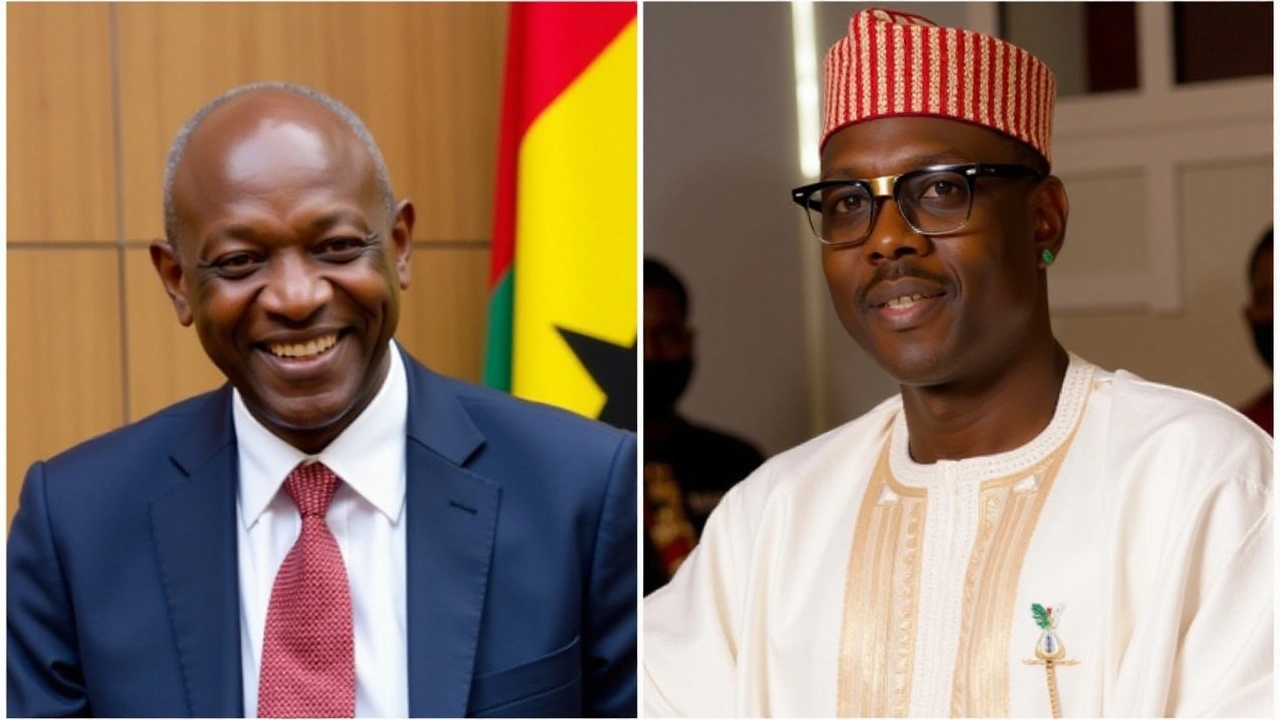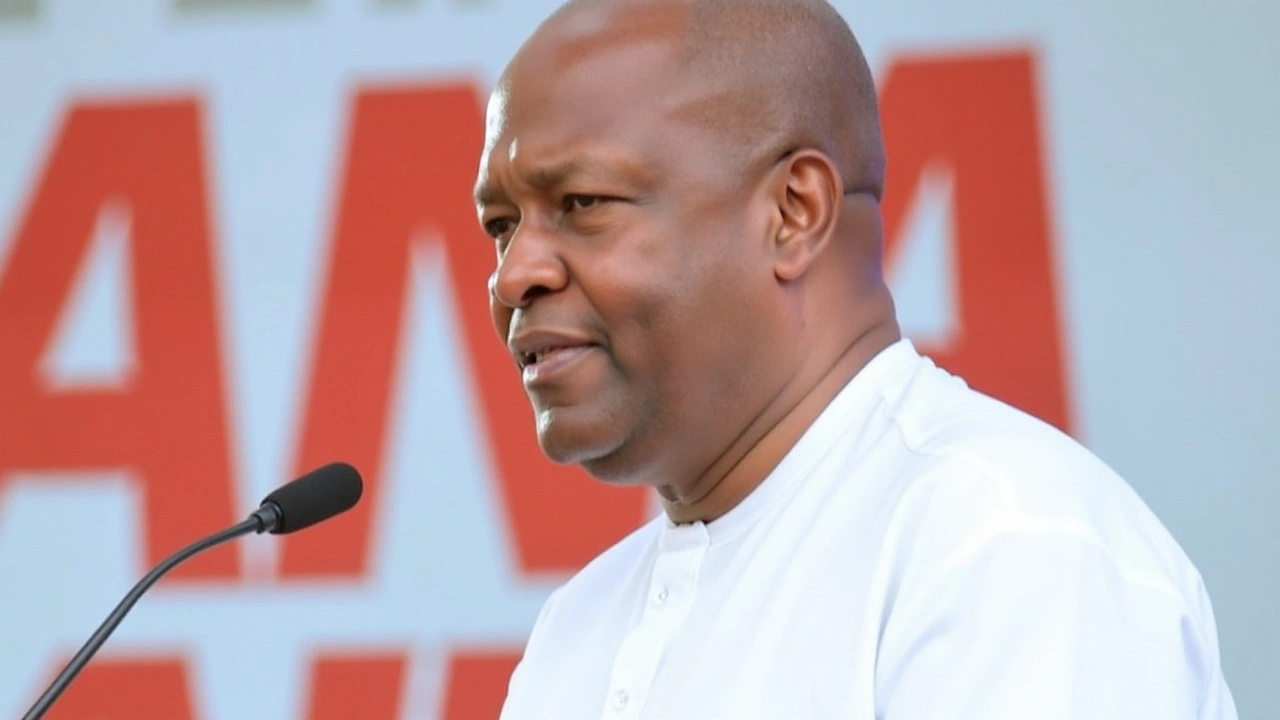John Mahama: Returning to the Helm
January 7, 2025, marked a historic day for Ghana as John Dramani Mahama was inaugurated for his second, non-consecutive term as the nation's President. This event signifies a milestone in the political landscape of the country, highlighting a continuity in democratic traditions and practices in West Africa. For observers of Ghanaian politics, this occasion is a significant turn as Mahama becomes the first leader in the nation to achieve this unique political feat. His tenure from 2012 to 2017 established him as a prominent figure committed to the progress and stability of Ghana.
The crowd at the newly built Jubilee House, Accra's Presidential Palace, was bustling with excitement and anticipation. The presence of the Commonwealth Secretary-General, alongside representatives from numerous countries, signaled international recognition of Ghana's successful electoral process. This event not only solidifies Mahama's position but also reinforces international faith in Ghana’s democratic process. Ghana stands as a beacon of democracy and governance in a region frequently challenged by instability, making this inauguration more than just a domestic affair; it’s a statement of resilience and hope.
Pre-Inauguration: Political Climate and Campaign Highlights
The pathway to Mahama's presidency this time was paved with challenges. Campaigning in the 2024 elections, his messages resonated particularly well with the sectors of society demanding a stable and visionary leadership. His proposals focused on reviving the economy, restructuring governmental frameworks to curb corruption, and addressing pressing societal issues like youth unemployment. These aspects were crucial factors in galvanizing support across Ghana's diverse regions and eventually driving Mahama's triumphant return to office.
His victory also reflects the trust people have in his leadership based on his past achievements. During his previous presidency, Mahama made significant strides in expanding infrastructure and actively sought improved diplomatic relations with global powers. However, like any leader, not all initiatives bore fruit, and his administration faced economic challenges and issues of governance. Nevertheless, his current platform adopting solutions to learn from the past while moving toward a better future was appealing to the electorate.
Challenges Ahead: Economic and Social Concerns
Ghana under Mahama faces profound challenges amidst global and internal pressures. Youth unemployment remains a persistent problem, posing a threat not just as an economic issue, but as a social challenge that affects stability and quality of life for young Ghanaians. Mahama has pledged to implement targeted educational programs and economic reforms aimed at job creation. These initiatives align with an overarching goal to empower youth as drivers of innovation and growth.
Adding to economic woes, Ghana struggles with inflation and a sovereign debt crisis. These challenges potentially hamstring developmental goals, affecting everything from infrastructure projects to essential social services. Mahama's administration is expected to employ fiscal discipline, aiming to stabilize the economy with efforts like renegotiating debt terms and attracting foreign investments through improved regulatory frameworks intended to boost investor confidence.
Strengthening Democracy: A Comparative Regional Outlook
Observers have noted that Mahama’s ascension to the presidency comes at a critical point for West Africa as regions neighboring Ghana contend with instability caused by coups and conflicts. Ghana continues to distinguish itself from regional turmoils, portraying a climate of civic engagement and adherence to democratic principles. Such ideals garner not only the admiration and support of the Commonwealth but that of democratic governance advocates globally.
The commemoration of Mahama’s inauguration also acts as a reminder of Ghana’s established history that respects democratic transitions of power, retaining an institutional integrity that many countries around the world aspire to achieve.

The Path Forward: Policy Initiatives and Implementation
The expectations from Mahama's government to deliver are intense. Amid urging for economic recovery and improvements in public sector efficiency, his administration's projected path includes strategic policy interventions tailored to specific socio-economic needs. Tackling corruption requires instituting transparency measures within governmental operations, ensuring accountability throughout various departments.
Efforts to address governance and development issues will necessitate a collaborative approach that encourages inclusive political decision-making processes. Mahama’s leadership style shows a propensity for consensus-building, emphasizing dialogue between governmental bodies, civil society, and the Ghanaian populace, every step essential in assuring that socio-political initiatives accommodate the needs and voices of all stakeholders.
In conclusion, as John Mahama steps back into leadership, Ghana's international allies, the regional community, and its citizens are watching eagerly, hopeful that his administration will lead with vision, decisiveness, and a commitment to bolstering the nation's democratic fabric. The journey is fraught with challenges, yet it also brims with opportunities for resonance and renewal under competent leadership. The coming years will reveal how the tenets of experience and innovation blend to shape the trajectory of a nation committed to principled leadership and developmental excellence.

12 Comments
shubham garg January 8 2025
Wow, what a milestone for Ghana!
LEO MOTTA ESCRITOR January 9 2025
Seeing Mahama back in the seat really shows how resilient the Ghanaian democratic spirit is. The whole region could learn a thing or two about peaceful transfers. It's awesome to see international bodies cheering on the process. Hope this momentum translates into real improvements on the ground.
Sonia Singh January 11 2025
I feel hopeful that the new term might finally tackle some of those lingering economic issues. The focus on youth jobs is especially encouraging. Let’s keep an eye on how the policies unfold over the next few months.
Ashutosh Bilange January 12 2025
Mahama defintely has a big task ahead, wont be easy but the people seem ready for change. The infrastrucutre promises sound great, just need to see real action. Time will tell if the promises hold up.
Kaushal Skngh January 13 2025
Honestly, another term sounds fine but let’s see if anything actually shifts. I've heard similar promises before, so we'll wait and watch.
Harshit Gupta January 14 2025
Finally a leader who truly values Ghana's sovereignty and heritage! This administration must prioritize national pride and push back against any foreign meddling. The economy will thrive when we put Ghana first, and corruption will crumble under true patriotic resolve.
HarDeep Randhawa January 15 2025
So, Mahama's back… what does that even mean for the average Ghanaian? Are we talking about new policies, fresh reforms, or just more of the same? Honestly, I'm torn-part of me wants change, part of me worries about repeating past mistakes… but hey, let's see what happens!
Nivedita Shukla January 16 2025
John Mahama’s return to power is a narrative that intertwines history, hope, and the perpetual quest for progress. It reminds us that democracy is not a static event but a living, breathing organism that evolves with each election cycle. The ceremony at Jubilee House symbolized more than a transfer of authority; it echoed the resilience of a nation that has weathered coups and turbulence. One cannot ignore the weight of expectations placed upon his shoulders, especially from the youth yearning for employment and stability. The emphasis on educational reforms suggests a recognition that knowledge is the true catalyst for societal transformation. Yet, the specter of inflation and debt looms like a storm cloud over any ambitious agenda. Mahama’s pledge to renegotiate debt terms could be the lifeline needed to restore investor confidence. Simultaneously, transparency measures promise to curb the corruption that once eroded public trust. In a region where many neighbors grapple with authoritarian backslides, Ghana stands as a beacon of democratic continuity. It is this contrast that amplifies both the pride and the pressure felt by its citizens. While the Commonwealth’s applause adds a layer of international legitimacy, it also raises the bar for delivering tangible results. The upcoming months will likely be a crucible where policy meet reality. If youth unemployment can be tackled through actionable programs, it will signal a true alignment with Mahama’s campaign promises. Moreover, a stable macroeconomic environment could unleash a wave of entrepreneurship previously stifled by uncertainty. Philosophically, the nation’s journey illustrates that leadership is a relay race-each leader passes the baton, but the future still rests in collective hands. Ultimately, the true measure of this historic transition will be seen not in speeches, but in the everyday lives of Ghanaians.
Rahul Chavhan January 18 2025
Ghana’s focus on debt renegotiation could set a precedent for other emerging economies struggling with similar burdens. If successful, it may open doors for broader regional financial stability.
Joseph Prakash January 19 2025
Totally agree with you 🙌 it's all about that smart fiscal move and yeah could ripple out big time 🚀
Arun 3D Creators January 20 2025
Man Mahama’s nationalist vibe could really rally the crowd but gotta make sure it doesn’t turn into isolationist nonsense we’ve seen elsewhere
RAVINDRA HARBALA January 21 2025
The reality is that nationalist rhetoric often masks deeper systemic issues; without structural reforms the economy will remain vulnerable regardless of patriotic slogans